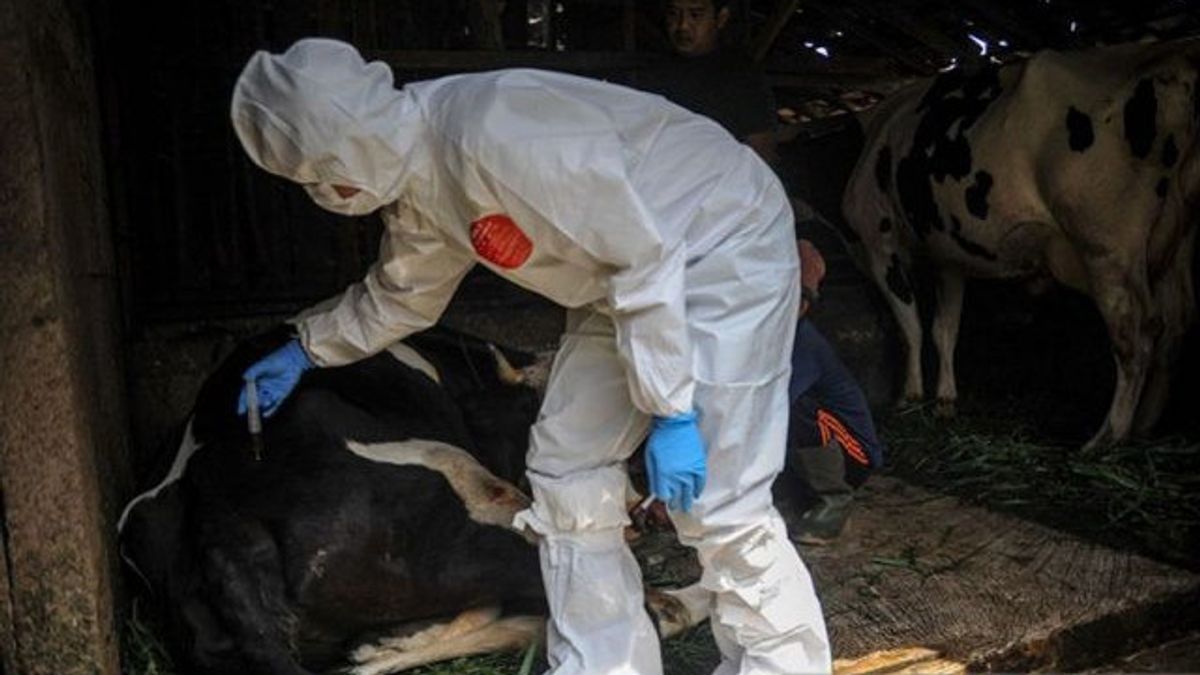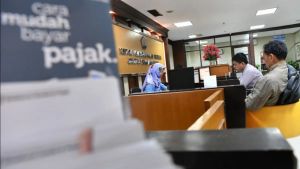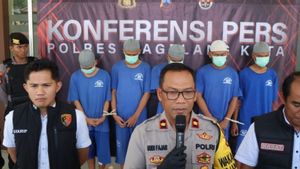JAKARTA - Coordinating Minister for Economic Affairs Airlangga Hartarto said the government was accelerating vaccination and administering drugs to prevent the spread of foot and mouth disease (FMD) in livestock.
"Currently, the government's efforts are to immediately procure and distribute vaccines in large quantities and immediately vaccinate livestock. With this, it is hoped that herd immunity can be achieved soon," said Airlangga, quoted from Antara, Monday, June 20.
Based on the data he has collected, as of June 18, 2022, FMD has spread to 19 provinces and 199 regencies/cities.
The number of sick cases was 184,646, 56,822 recovered (30.77 percent), conditional slaughter 1,394 (0.75 percent), 921 deaths (0.50 percent) and 51 vaccinated.
Meanwhile, the total population of all livestock that are at risk and threatened (cows, buffaloes, goats, sheep, and pigs) are 48,779,326 heads.
Coordinating Minister Airlangga requested that various regulations related to FMD be completed and implemented immediately to prevent the spread of FMD disease outbreaks and to maintain the quality of Indonesian livestock.
The first PMK vaccination was carried out on June 14, 2022 in Sidoarjo Regency, East Java, then it will be encouraged for basic vaccinations, namely 2 vaccinations with a distance of 1 month, as well as booster vaccines every 6 months. The vaccination program will be carried out by approximately 1,872 medical personnel and 4,421 paramedics.
In the future, about 28 million doses of priority vaccination are needed and currently 3 million doses have been imported, of which 0.8 million doses are in the Government procurement process, while the 2.2 million doses are in the process of being refocused to finance the budget.
Then the supply of vaccines in the next 3 months is capable of more than 16 million doses from importers of vaccine providers. Meanwhile, domestic vaccines are from Pusvetma and from other domestic vaccine manufacturers.
"To meet the need for 28 million doses by the end of 2022, one of which is the Government will cooperate with private importers with the number of vaccines that are needed with government control and supervision," he said.
In addition, Airlangga continued, the Government is preparing trained human resources for PMK vaccination as well as eartage and livestock data collection. Cattle that have been vaccinated must have ear tags attached to their ears (with the developer of the system, namely PT Peruri) and currently 236 thousand eartages are available.
“We have to consider the wider conditions, not only the issue of prevention, but also look at the consequences in the future because livestock is an asset. So if PMK is not resolved, it will be an invaluable loss, especially for small farmers," he said.
Furthermore, Airlangga explained that considering the number of PMK vaccinations is still very low, it is necessary to regulate and supervise animal and livestock traffic for sub-districts or villages based on zoning, namely the Red Zone (Outbreak Area), Orange Zone (Infected Area), Yellow Zone (Infected Areas). Suspected Area) and Green Zone (Free Area). Livestock traffic between these risk zones will continue to be monitored, and will also be controlled by the TNI/POLRI.
"This system is important, don't just look at the small percentage of cases, but we don't want this to continue to expand," he said.
The government decided to use APBN, APBD and other funding sources, especially to implement the plan to provide compensation for farmers (especially small farmers) whose livestock died from PMK or who were subjected to forced slaughter.
A PMK Control and Handling Team led by the Ministry of Agriculture and supported by BNPB and other relevant K/L has also been formed to deal with PMK.
"The handling of this PMK is micro-based, involving all stakeholders, namely K/L and regions, the breeders themselves to the academics to the private sector to jointly resolve this PMK incident," he said.
The English, Chinese, Japanese, Arabic, and French versions are automatically generated by the AI. So there may still be inaccuracies in translating, please always see Indonesian as our main language. (system supported by DigitalSiber.id)













